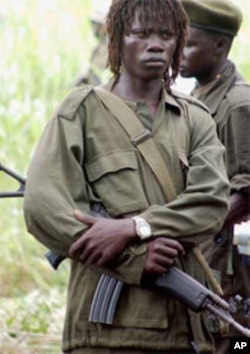A report released Monday outlines a plan to demobilize the Ugandan rebel group the Lord’s Resistance Army.
After operating in northern Uganda since 1987, the LRA recently split into about 10 smaller groups. In recent years, it’s been blamed for attacks in southern Sudan, the eastern DRC and the Central African Republic.
Now, the report says, many members of the LRA have “given up the fight” and want to return home. But they’re encountering many obstacles to demobilization and rejoining society.
Far from home
The report, published by the Enough Project, is called Too Far from Home. Speaking from Goma in the eastern DRC, lead author Ledio Cakaj says, “The report is called Too Far from Home because former LRA combatants have been in the last two years led by their commanders in small groups very far away from Uganda. At times, over a thousand kilometers usually from northern Uganda.”
Part of the ideology of the LRA, he says, had been to fight on behalf of northern Uganda. “A lot of fighters said they found themselves so far from northern Uganda that it was impossible to maintain the same ideology.”
What’s more, Cakaj says, “It’s also symbolically titled…because even when they’re physically back home in northern Uganda, they still remain far from home in that they have no opportunity to reintegrate. And in many cases they feel worried and scared that the local communities will (seek) revenge.”
The LRA has been blamed for killing and maiming thousands of civilians and kidnapping thousands of children and forcing them to fight. The report says many LRA fighters were forced to commit murder by their commanders.
“So, even when they’re back in Uganda, even when they’ve left the LRA, many of the former combatants remain, symbolically and metaphorically speaking, still far from home,” he says.
Mobilizing demobilization
“That starts with simply to sort of change the incentive structure of people still in the LRA. It’s amazing to think that despite all the hardships that a lot of these fighters go through while they fight in the jungle – including lack of medicine if they get sick or shot and also some of them (get) daily beatings by commanders who treat some of the soldiers badly, as well as constant pursuit by the Ugandan army forces – they still find that it is sometimes easier to stay in the LRA than leave,” he says.
The Enough Project report says many former LRA fighters have been mistreated by various armies once they gave up their weapons to enter demobilization programs. It says the former rebels have received “particularly” bad treatment from the Congolese army. However, MONUSCO, the U.N. force in the eastern DRC, receives praise for its handling of the former combatants.
Cakaj says, “They fear they’re going to get killed by the local population in Central African Republic, Sudan and Congo.” He says LRA commanders play on this fear to discourage fighters from entering the demobilization program.
Amnesty
In 2005, the International Criminal Court issued arrest warrants for LRA leader Joseph Kony and four other commanders, accusing them of crimes against humanity and war crimes for atrocities in northern Uganda. It’s believed two of the four have been killed. Kony’s whereabouts are unknown.
In 2000, Uganda passed the Amnesty Act, offering blanket immunity for LRA rebels who surrender their weapons. Kony and the commanders are not included.
The report says the former fighters face major challenges when they return to Uganda.
“They do not receive or they haven’t received in the past 18 to 24 months amnesty certificates that they’re bound to receive by Ugandan law, the Amnesty Act of 2000. They have not received their reintegration packages that include a little bit of money, some utensils and a mattress. And they lack general opportunities to reintegrate – economic opportunities and social opportunities,” he says.
The report says former LRA rebels are also pressured to join the Ugandan army and return to the jungles to fight.
What should be done?
Cakaj says, “There has to be, first of all, a demobilization-integration strategy complied by the Ugandan army – with the help of the U.S., as well as the United Nations – that specifies what should happen to the former combatants, that ensures that most of the challenges are removed.”
The report recommends the creation of demobilization committees that include members from the Congolese, Sudanese and Ugandan armies and local and religious leaders.
“To ensure that former combatants that come out are not lynched,” says Cakaj, “These are all methods that DDR (Disarmament, Demobilization, Reintegration) offices in the world have done in the past.”
In May 2009, President Obama signed the Lord's Resistance Army Disarmament and Northern Uganda Recovery Act. Mr. Obama said, “The legislation crystallizes the commitment of the United States to help bring an end to the brutality and destruction that have been a hallmark of the LRA across several countries for two decades, and to pursue a future of greater security and hope for the people of central Africa.”
The legislation calls for a regional strategy to support efforts to protect civilians and eliminate the threat posed by the Lord's Resistance Army and to authorize funds for humanitarian relief and reconstruction, reconciliation and justice.




